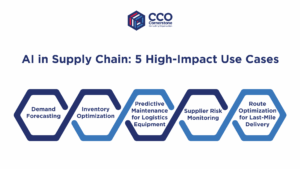In today’s fast-moving global marketplace, supply chains are no longer simple linear systems—they’re complex, interconnected networks vulnerable to disruptions at every stage. From raw material shortages to sudden shifts in demand, resilience is the differentiator between thriving businesses and those that falter.
Supply chain staffing, supply chain management services, and logistics strategy services now integrate AI in supply chain management to strengthen visibility, predict challenges, and enable faster, smarter decision-making. CCO’s expertise lies in helping organizations design and run intelligent, agile networks that can adapt and recover rapidly.
Defining Resilience in Modern Supply Chains with AI
Resilience is the capacity of a supply chain to anticipate, respond to, and recover from disruptions while maintaining continuous operations and meeting customer demands. This extends beyond having backup suppliers or extra inventory—it’s about building systems that are:
- Proactive: Identifying vulnerabilities before they become problems.
- Flexible: Quickly reconfiguring operations when conditions change.
- Transparent: Providing end-to-end visibility across suppliers, logistics providers, and internal teams.
- Data-Driven: Making strategic moves based on real-time insights rather than reactive guesswork.
AI in supply chain management enhances each of these traits by adding predictive intelligence, automated monitoring, and prescriptive analytics into the core of supply chain solutions.
AI-Driven Forecasting and Inventory Control in Supply Chain Solutions
One of AI’s most impactful applications in supply chain management services is in demand forecasting and inventory optimization.
- Demand Forecasting
Machine learning models analyze historical sales, seasonal patterns, economic indicators, and even social sentiment to predict demand more accurately. This reduces the risk of overstocking or stockouts and enables just-in-time replenishment strategies. - Inventory Control
AI-powered inventory management systems can monitor stock levels in real time, automatically adjusting reorder points and quantities based on demand signals, lead times, and supplier performance. This minimizes carrying costs while improving order fulfillment rates. - Dynamic Replenishment
Using predictive analytics, businesses can simulate various demand scenarios and adjust procurement schedules accordingly—keeping supply chains lean yet resilient.
Pro Tip:
“Integrate AI forecasting with your ERP to ensure changes in demand are reflected instantly across your operations, preventing overstock issues and lost sales.”
Supplier Risk Modeling with Machine Learning for Stronger Supply Chain Management Services
In a global supply network, a single supplier’s disruption can cascade through production and delivery timelines. AI helps mitigate this through supplier risk modeling.
- Performance Scoring
Algorithms assess supplier reliability based on historical delivery times, defect rates, and contract compliance. - Risk Indicators
AI monitors financial health, geopolitical risks, environmental impact, and even media sentiment to flag potential disruptions early. - Multi-Tier Visibility
Advanced platforms track beyond direct suppliers to sub-tier vendors, ensuring hidden vulnerabilities are uncovered. - Predictive Alerts
By detecting anomalies such as delayed shipments or changes in lead times, AI enables businesses to act before issues escalate.
Pro Tip:
“Don’t just monitor Tier 1 suppliers—AI makes it possible to see deeper into the chain and uncover risks you didn’t know existed.”
Tools and Platforms for AI in Supply Chain Management
The right platforms are key to making AI-enabled supply chain solutions a reality. Leading solutions include:
- Blue Yonder – Specializes in AI-driven demand planning, inventory optimization, and transportation management.
- Llamasoft (Coupa) – Offers network design, scenario modeling, and AI-powered risk analysis.
- Kinaxis RapidResponse – Provides real-time supply chain monitoring, what-if simulations, and collaborative planning.
- o9 Solutions – Integrates demand sensing, supply planning, and revenue management into a unified AI platform.
- SAP Integrated Business Planning – Combines AI forecasting with ERP integration for end-to-end visibility.
When selecting a platform, businesses should evaluate integration capabilities with existing systems, scalability, data security, and user experience.
Take the Next Step Toward Smarter Supply Chain Solutions and Logistics Strategy Services
Resilient supply chains don’t just happen—they’re built with strategy, the right talent, and powerful technology. CCO helps organizations integrate AI in supply chain management, optimize logistics strategy services, and strengthen supply chain staffing to adapt, scale, and succeed in any market condition.
As a trusted business operations firm and operations partner, we also support enterprises with enterprise operations services, workforce optimization solutions, and operations staffing solutions to ensure resilience and performance.
Ready to future-proof your supply chain?
Contact our team today to explore AI-powered supply chain management services tailored to your operational goals.
FAQs on AI in Supply Chain Management and Supply Chain Staffing
What AI tools are best for supply chain planning?
Some of the most effective AI-enabled platforms include Blue Yonder, Kinaxis RapidResponse, and o9 Solutions. These tools specialize in combining real-time data with predictive analytics, allowing businesses to simulate scenarios, optimize resources, and ensure operational resilience. Selection should depend on your supply chain size, complexity, and integration needs.
How does AI reduce supply chain risk?
AI reduces risk by detecting potential disruptions early—whether through supplier performance monitoring, predictive maintenance on critical equipment, or real-time demand and inventory adjustments. It offers deep visibility into multi-tier supply networks and provides actionable insights, enabling proactive decisions rather than reactive damage control.

